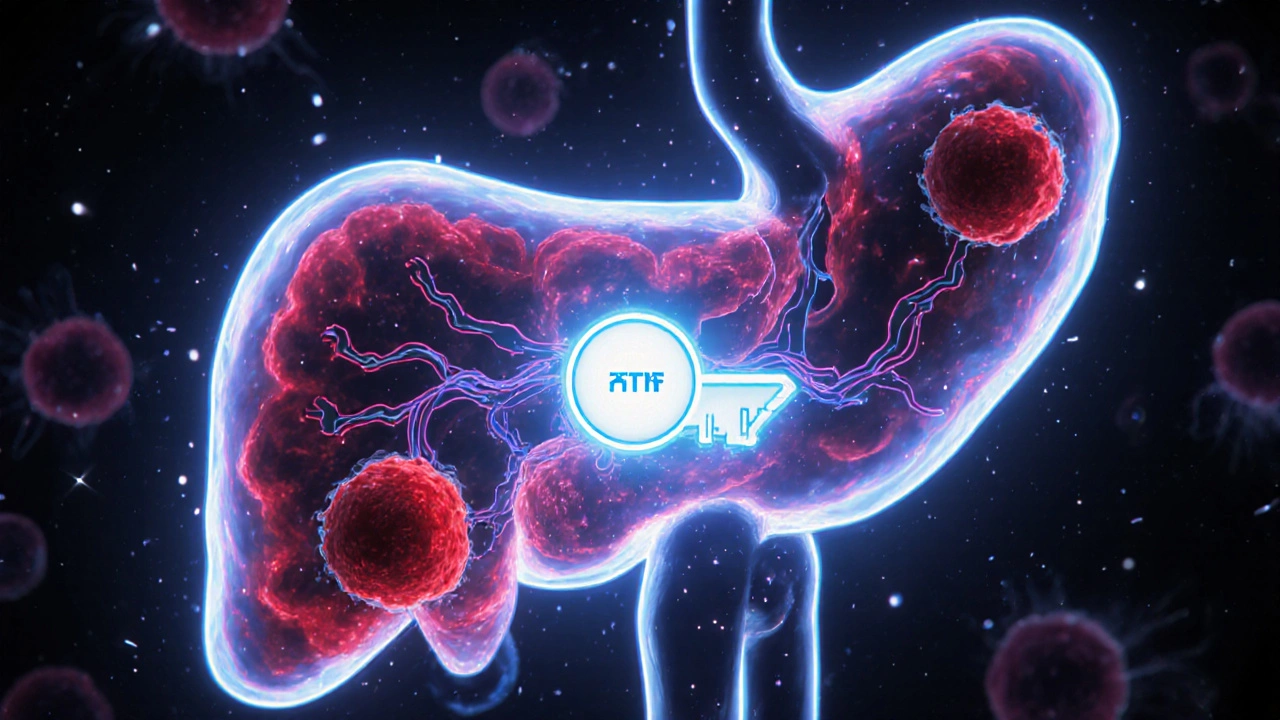When pancreatic cancer is diagnosed, the options often feel limited. It’s aggressive, hard to detect early, and doesn’t always respond well to standard chemo. But in recent years, one drug has carved out a real place in treatment plans for certain patients: everolimus. It’s not a cure, but for some, it’s a chance to slow the disease down and buy more time - sometimes with fewer side effects than traditional chemotherapy.
What Everolimus Actually Does
Everolimus is a type of drug called an mTOR inhibitor. That sounds like jargon, but here’s what it means in plain terms: cancer cells need to grow and divide nonstop. To do that, they rely on a signaling pathway inside the cell called mTOR - like a switch that says, "Go, grow, divide." Everolimus flips that switch off. It doesn’t kill cancer cells directly. Instead, it starves them of the signals they need to multiply.
This is different from chemo, which blasts all fast-growing cells - healthy or not. Everolimus is targeted. It’s designed to interfere with a specific molecular process that’s overactive in some cancers, including certain types of pancreatic cancer. That’s why it’s called a targeted therapy.
The drug was originally developed for kidney cancer and transplant patients, but research showed it could also work against tumors that rely on the mTOR pathway. In pancreatic cancer, that’s often the case when the tumor has mutations in genes like PIK3CA, AKT, or PTEN - all part of the same signaling network.
When Everolimus Is Used for Pancreatic Cancer
Everolimus isn’t a first-line treatment. You won’t get it right after diagnosis. It’s usually reserved for advanced or metastatic cases that have already been treated with other drugs - most commonly, gemcitabine-based chemotherapy.
In 2011, the FDA approved everolimus for use in advanced pancreatic neuroendocrine tumors (PNETs), a rare but distinct subtype of pancreatic cancer. These tumors arise from hormone-producing cells in the pancreas, not the more common ductal cells. PNETs grow slower than regular pancreatic cancer, and they’re more likely to respond to mTOR inhibitors.
For the more common type - pancreatic ductal adenocarcinoma (PDAC) - everolimus hasn’t shown strong results on its own. But it’s still being tested in combination with other drugs. One study from 2023 looked at everolimus paired with a drug called paclitaxel in patients whose cancer had spread. The group that got both drugs lived about 3 months longer on average than those who got paclitaxel alone. That’s not a huge win, but in pancreatic cancer, even a few extra weeks can matter.
Who Benefits Most?
Not everyone with pancreatic cancer will respond to everolimus. The key is finding the right patients. Doctors now use biomarker testing to look for specific genetic changes in the tumor. If a patient’s tumor shows signs of mTOR pathway overactivation - like loss of PTEN protein or high levels of phosphorylated S6 - they’re more likely to benefit.
There’s also a subgroup of patients with hereditary conditions like tuberous sclerosis complex (TSC). These individuals have a higher risk of developing PNETs, and everolimus is often part of their long-term care plan. For them, it’s not just about treating cancer - it’s about managing a chronic condition.
Age and overall health matter too. Everolimus is taken as a daily pill, which is easier than weekly IV chemo. That makes it a good option for older patients or those who can’t tolerate harsher treatments. But it’s not without side effects.

Side Effects and How to Manage Them
Everolimus is generally better tolerated than chemotherapy, but it’s not gentle. The most common issues are mouth sores, fatigue, rash, and increased risk of infection. About 1 in 4 patients develop non-infectious pneumonia - called interstitial lung disease - which can be serious if not caught early.
Doctors monitor blood counts, liver function, and lung health regularly. Patients are advised to avoid live vaccines and to report any new cough, shortness of breath, or fever right away. Mouth sores can be managed with saltwater rinses and special gels. Skin rashes often respond to topical steroids or antihistamines.
One thing many patients don’t expect: everolimus can raise blood sugar and cholesterol levels. If you’re diabetic or have high cholesterol, your doctor will likely adjust your medications while you’re on this drug. It’s not a reason to stop treatment - just something to watch closely.
How It Compares to Other Targeted Therapies
There are other targeted drugs for pancreatic cancer, like PARP inhibitors (olaparib) for BRCA-mutated tumors, or trastuzumab for HER2-positive cases. But everolimus is one of the few options that works across different mutation types - as long as the mTOR pathway is active.
Compared to olaparib, which only helps about 10% of patients with BRCA mutations, everolimus has a broader potential reach. But it’s also less effective on its own. That’s why researchers are testing it in combinations: with immunotherapy, with MEK inhibitors, even with older chemo drugs.
One recent trial combined everolimus with a drug called nivolumab, which helps the immune system attack cancer. Early results showed some patients had stable disease for over a year - something rare in advanced pancreatic cancer. It’s not a breakthrough yet, but it’s a direction worth watching.

The Future of Everolimus in Pancreatic Cancer
Right now, everolimus is a tool in the toolbox, not a game-changer. But science is moving fast. Newer versions of mTOR inhibitors are being developed - ones that are more precise, with fewer side effects. Some are even designed to cross the blood-brain barrier, which could help if the cancer spreads to the brain.
There’s also growing interest in using everolimus as a maintenance therapy. After initial chemo shrinks the tumor, instead of stopping treatment, some doctors give patients everolimus to keep the cancer from bouncing back. Early data suggests this approach might delay progression by several months.
What’s exciting is how it fits into personalized medicine. We’re no longer treating pancreatic cancer as one disease. We’re breaking it into subtypes based on genetics, behavior, and response patterns. Everolimus belongs in the mTOR-driven group - and as we get better at identifying that group, its role will only grow.
What Patients Should Ask Their Doctor
If you or someone you know has advanced pancreatic cancer, here are five questions to ask:
- Has my tumor been tested for mTOR pathway activation or PTEN loss?
- Am I a candidate for everolimus based on my cancer type and treatment history?
- What are the chances it will work for me, based on my biomarkers?
- What side effects should I watch for, and when should I call you?
- Are there any clinical trials combining everolimus with other new drugs?
Don’t assume everolimus is off the table just because it’s not first-line. It’s worth discussing - especially if other options are running out.
Final Thoughts
Pancreatic cancer is tough. But every small advance matters. Everolimus doesn’t bring miracles. But for some patients, it brings stability. It lets them keep working, spend time with family, or just wake up without nausea or pain for a few more months. That’s not nothing.
Science didn’t stop at chemo. Targeted therapies like everolimus are proof that we’re learning how to fight cancer smarter - not just harder. And for people facing this disease, that’s the kind of hope that lasts longer than a statistic.
Is everolimus a chemotherapy drug?
No, everolimus is not chemotherapy. It’s a targeted therapy that blocks a specific protein (mTOR) cancer cells use to grow. Chemotherapy kills fast-growing cells broadly, including healthy ones. Everolimus is more precise and usually has fewer side effects like hair loss or severe nausea.
Can everolimus cure pancreatic cancer?
No, everolimus cannot cure pancreatic cancer. It’s used to slow tumor growth and extend survival in certain cases, especially advanced or metastatic disease. It’s a management tool, not a cure. Some patients live longer with better quality of life while taking it, but the cancer usually continues to progress over time.
What type of pancreatic cancer responds best to everolimus?
Pancreatic neuroendocrine tumors (PNETs) respond best to everolimus. These are rarer than the more common ductal adenocarcinoma. PNETs often have active mTOR pathways, making them more sensitive to the drug. Everolimus is FDA-approved specifically for advanced PNETs. For ductal adenocarcinoma, responses are less consistent and usually seen in combination with other treatments.
How long do patients typically stay on everolimus?
There’s no fixed timeline. Patients usually stay on everolimus as long as it’s controlling the cancer and side effects are manageable. Some stay on it for months, others for years. Treatment stops if the cancer starts growing again, if side effects become too severe, or if a better option becomes available. Regular scans and blood tests help doctors decide when to continue or stop.
Can everolimus be taken with other cancer treatments?
Yes, but only under close medical supervision. Everolimus is often combined with chemotherapy drugs like paclitaxel or targeted agents like nivolumab in clinical trials. However, combining it with other drugs can increase side effects - especially immune-related issues or lung inflammation. Never mix it with other treatments without your oncologist’s approval.
Does everolimus work for all pancreatic cancer patients?
No. Everolimus only works for patients whose tumors rely on the mTOR signaling pathway. This is determined through genetic testing of the tumor tissue. Only a subset of patients - particularly those with PNETs or specific mutations like PTEN loss - benefit significantly. Most patients with common pancreatic ductal adenocarcinoma don’t respond well to everolimus alone.

j jon
October 27, 2025 AT 16:09My uncle was on everolimus for his PNET. Didn’t cure it, but he kept working part-time, cooked Sunday dinners, even took his grandkids to the lake. Side effects? Yeah, mouth sores were rough. But he said the quiet days without chemo nausea were worth it.
Jillian Fisher
October 29, 2025 AT 10:27I read the part about biomarker testing and wondered - how often do docs skip that step because it’s expensive or slow? My mom’s oncologist just jumped to chemo without mentioning everolimus or PTEN. We had to push for the test. If you don’t ask, you don’t get the info.
Rachel Marco-Havens
October 30, 2025 AT 22:00People act like everolimus is some miracle drug but let’s be real it’s just another bandaid. We’re spending billions on pills that buy months not cures while real prevention gets ignored. Stop romanticizing incremental gains. Focus on early detection. That’s where the real hope is.
Kathryn Conant
October 31, 2025 AT 21:23Everolimus isn’t glamorous but it’s one of the few things that lets people breathe again. No hair loss. No hospital visits every week. Just a pill and a fighting chance. I’ve seen families choose this over chemo because they wanted their loved one to *live* not just survive. That’s powerful.
Jules Tompkins
November 1, 2025 AT 00:53Imagine your tumor has a little switch labeled "GO" and someone just flips it off with a tiny pill. That’s everolimus. No sledgehammer. No vomiting. Just… silence. Like turning down the volume on a screaming alarm. Quiet victory.
Sabrina Bergas
November 1, 2025 AT 17:40Everyone’s acting like mTOR inhibition is revolutionary but let’s not forget this drug was originally for transplant patients. We’re repurposing immunosuppressants for cancer like it’s some kind of biohack. The real breakthrough would be stopping cancer before it hijacks pathways - not just jamming the signals after the fact.
Melvin Thoede
November 3, 2025 AT 00:12My sister’s been on everolimus for 18 months. Her scans are stable. She’s gardening again. We don’t celebrate like it’s a cure - we just celebrate that she’s here. This drug doesn’t make headlines but it makes mornings possible. That’s enough.
Suzanne Lucas
November 4, 2025 AT 12:09My cousin was told she had 6 months. She got everolimus. She’s still here. Two years later. She’s got a blog now. She calls it her "quiet rebellion." Every day she wakes up and says "not today, cancer." And you know what? She’s winning.
Ash Damle
November 6, 2025 AT 05:09My dad’s oncologist said everolimus might help but only if his tumor had PTEN loss. We got the test. Negative. He went back to chemo. Still had side effects. But at least we knew we tried the right path. Knowledge matters more than false hope.
Kevin Ouellette
November 7, 2025 AT 03:32For anyone reading this - if your doctor hasn’t mentioned biomarker testing or everolimus, ask. Don’t wait. You’re not being pushy, you’re being smart. And if it’s not for you, that’s okay. But if it is? It might just give you back the quiet, ordinary days you didn’t know you were fighting for.